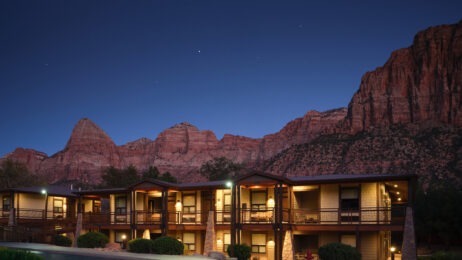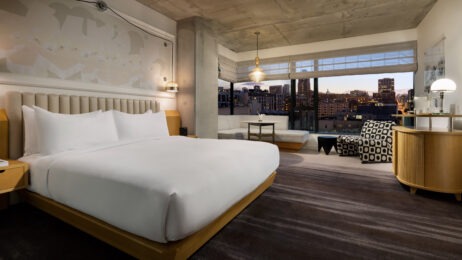Green is the new black—for hotels, especially. In the past decade the hotel industry—particularly the big-box giants—have wholeheartedly embraced green initiatives. And for good reasons. Energy- and water-saving investments are not only better for the environment, but they are also great for the bottom line. Now, with the public becoming increasingly aware of the effects their eco-actions have, hotels have also seen the marketing advantage good environmental stewardship can reap.
United States
LEED Platinum Hotels
The “Oscar” of green is Leadership in Energy and Environmental Design (LEED) certification from U.S. Green Building Council, and highest of the high is Platinum rating. Only five U.S. hotels have achieved that status. Here they are to take a bow.
Bardessono, Yountville, California
All wood used throughout the 62-room hotel was milled from salvaged trees. Nontoxic, nonallergenic materials were used in construction. Linens are organic, and cleaning supplies are eco-friendly. Recycling and composting is extensive. The restaurant and spa source primarily from organic producers. Green materials include soy fiber-based rugs and green-certified fabrics.
Hotel Skyler Syracuse, New York
Part of the Tapestry Collection by Hilton, this 58-room hotel in a building nearly a century old uses a geothermal system for heating and cooling—harnessing the earth’s constant temperature in 16 vertical wells. Guest rooms feature eco-friendly amenities.
The Hotel at Oberlin, Ohio
At the edge of Oberlin College campus, this 70-room hotel was first in the country to use solar, geothermal and radiant heating and cooling. Wood used came from a dismantled, 19th-century farmhouse. Bathroom amenities are locally produced.
Proximity Hotel, Greensboro, North Carolina
The more than 70 sustainable practices at this 147-room hotel include solar water heaters, use of salvaged wood in construction, geothermal cooling for the restaurant’s refrigeration system and an eco-friendly elevator that feeds captured energy back into the building’s electrical grid.
W San Francisco
At this 31-floor, 404-room property near Moscone Center, dramatic energy- and water-saving measures are supplemented by the fact that more than eight in 10 hotel employees use alternate methods such as bus or train to commute to work.
More Green Hotels
Of the hundreds more hotel properties that can claim green cred, here is a sampling that stand tall.
1 Hotel South Beach, Miami Beach, Florida
The second you view its website, it’s apparent that all 1 Hotels are dedicated to sustainability. This 426-room property in South Beach, in particular, is making many smart moves to reduce its carbon footprint. It has installed energy-efficient heating and cooling, LED lights to reduce electricity use, low-flow plumbing to conserve water, and it controls portions in the restaurants and bars—avoiding 395 tons of food waste. Sister property 1 Hotel Brooklyn Bridge in New York City is equally green.
Caesars Palace, Las Vegas
Caesars Entertainment, this hotel’s corporate parent, instituted its CodeGreen program in 2008, and it quickly became an integral part of Caesars Palace’s sustainability efforts. By 2014, all Caesars casino-resort properties in the United States were Green Key Certified. In 2016, Caesars made the CDP (formerly Carbon Disclosure Project) A-list “across core areas, including climate, water and supplier diversity). By 2020, it hopes to reduce greenhouse gases by 30 percent, and by 2025 it intends to divert 60 percent of waste from landfill.
Hilton Asheville Biltmore Park, North Carolina
Certified as LEED Silver, this 165-room property boasts a 33 percent reduction in water use, 21 percent of materials composed of recycled content and 76 percent of all wood extracted from sustainably managed forests. It also consumes 30 percent less water and 25 percent less energy than comparable hotels.
Hyatt Regency Coconut Point Resort & Spa, Bonita Springs, Florida
Hyatt’s hotels are becoming hot spots for waste diversion. This 454-room resort has introduced an ORCA Green Machine food waste composting system; the system utilizes microorganisms and recycled plastic chips to break down and transform food waste into environmentally safe water in a day’s time. In doing so, the resort has saved 7,000 pounds of food waste.
InterContinental San Francisco
A LEED Gold-certified hotel, this 450-room InterContinental property has replaced incandescent light bulbs with linear and compact fluorescents, reducing energy use by 65 percent; installed low-flow sink faucet aerators in all bathrooms, saving 30 percent of restroom water use; and has floor-to-ceiling windows in their meeting spaces, allowing natural light to flow in and reduce energy consumption.
MGM Resorts International
The big environmental news from this major hospitality company is partnership with Chicago-based Invenergy, North America’s largest independent renewable energy company, to build a new solar farm 25 miles north of Las Vegas. This photovoltaic array will generate 100 megawatts of clean, renewable energy, all of which will be purchased by MGM to help power its 13 properties on the Las Vegas Strip. The project will be operational by the end of 2020. It’s not the first solar investment for MGM. In 2016, the company completed expansion of the nation’s largest contiguous rooftop solar array at Mandalay Bay Convention Center.
International
&Beyond, Africa
&Beyond, a safari and hotel company based in South Africa with properties in several countries, is committed to green initiatives for the land, animals and people. Large proponents of recycling, conservation awareness events, water-saving efforts and reduction of pollution are just a few of their green action areas. &Beyond also created the Phinda Private Game Reserve, targeting “the underlying conservation issues to its interaction with the community.”
Accor Hotels, Worldwide
Accor Hotels’ 21 Planet Program is geared toward reducing its carbon footprint to zero, and it has already made impressive strides. From recycling orange peels to make marmalade to onsite organic gardens, to a mission of making every new and renovated hotel low-carbon-emitting, France-based Accor Hotels is a hotel company at the forefront of the eco-movement. Brands familiar in the United States include Fairmont, Sofitel, Novotel and Swissotel.
El Nido, Philippines
El Nido is a group of sustainable island resorts dedicated to sustainability. Their sewage treatment plants ensure that untreated waste water never finds its way to the ocean; rainwater systems capture, filter and store water for its facilities, and all lighting became compact fluorescents a decade ago.
Longitude 131 Degrees, Australia
Longitude 131 Degrees is a 235-room, luxury resort located just outside a UNESCO World Heritage site, Uluru-Kata Tjuta National Park, in the Northern Territory. From the construction of its guest cabins to the design of the lodge, the resort is eco-friendly at every turn. Buildings stand on stilts, allowing for easy removal if necessary and a pristine desert floor. Floors are insulated with stone to capture heat in winter months and cool warmer ones. And if you’re thirsty, don’t expect a plastic bottle—Longitude 101 offers reusable water bottles to reduce plastic waste.
Soneva, Maldives and Thailand
Since its inception in 1995, Soneva has been a pioneer in green initiatives. In 2000, the original hotel, Soneva Fushi, was awarded the President of Maldives’ Green Resort Award. In 2008, Soneva began monitoring its direct and indirect carbon emissions and banned bottled water. By 2015, Soneva had begun recycling glass bottle waste into glass art, launched a program to provide clean stoves to families in need, installed the largest solar plant in the Maldives and founded the Soneva Foundation, which funds programs to overcome social and environmental challenges. Its properties include Soneva Fushi and Sonevi Jani in the Maldives and Soneva Kiri in Thailand.
Tiamo Resort, The Bahamas
Tiamo, an “eco chic” resort on South Andros Island uses eco-friendly products for housekeeping, solar panels and water heaters and energy-efficient air-conditioning. Guests can request no housekeeping services to save on bed linen and towel laundry (and receive hotel credits). Composting benefits the resort’s organic garden and farm.




